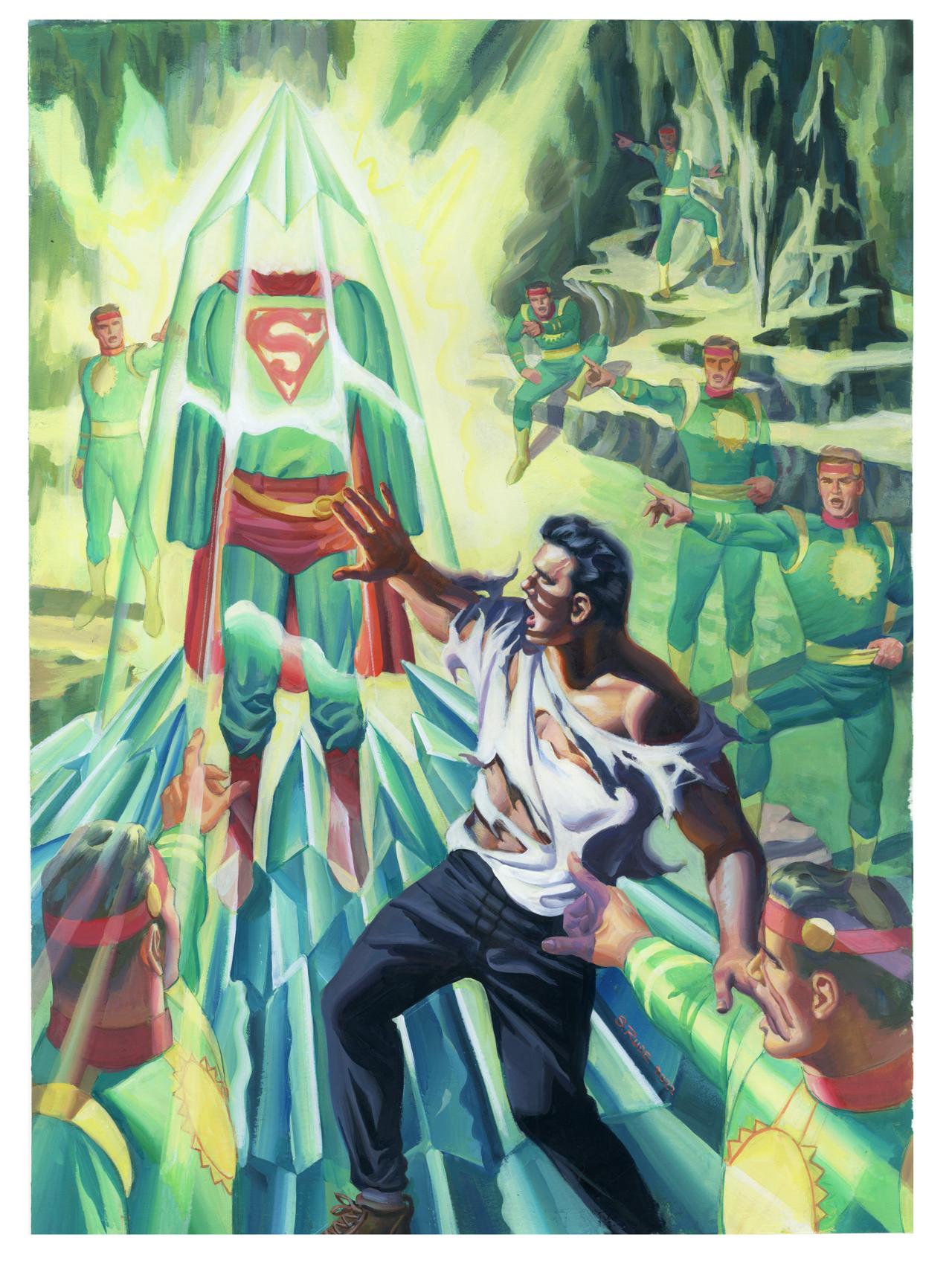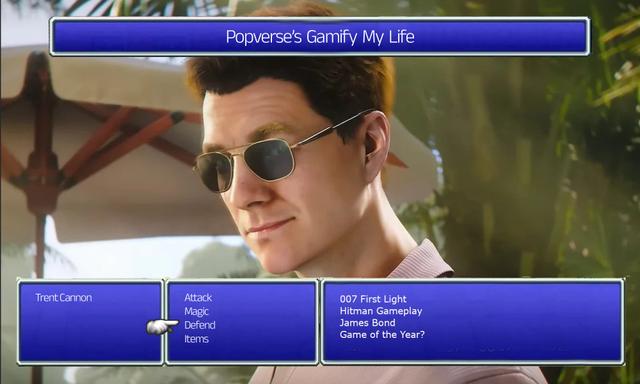If you click on a link and make a purchase we may receive a small commission. Read our editorial policy.
‘How would Superman react to the JFK assassination?’: Mark Russell answers in Space Age
A Superman of the 60s: Mark Russell on the History and Hope of the Space Age limited series

Superman: Space Age #1 is set in the '60s. For comics, those were not known for their realism. In fact, bring up the term ‘Silver Age’ to comic book fans and you’ll likely conjure memories of outlandish plots, brightly-costumed heroes, and ridiculous (though tame) supervillains. So what is Mark Russell doing injecting real world history into a comic set in the '60s?

Ahead of Issue One's release on July 26, the first of three in the Black Label series written by Russell and drawn by veteran Michael Allred, Popverse was able to ask just that question. We spoke to the writer about what pieces of history he was bringing into the story, how those events change Superman, and what (major) DC event will threaten the world he’s envisioned. Read on to learn more.
Popverse: Issue #1 did a great job setting up all the stuff to come, but at the same time, also had its own story. That is, Clark Kent’s journey from Kansas to Metropolis and taking on the Superman identity. Can we expect to see full stories like that in each issue?
Mark Russell: I hope so. That's definitely the way I tried to write it. It is obviously more gratifying if you read the entire series, but someone picking up Issue #2 or #3 without reading the first would still enjoy it as a self-contained story, not knowing what happened before. It helps that each issue focuses on a different decade. So I feel like it really lends itself well to that sort of episodic storytelling, within a larger plotline.
It's great that you bring that up, because one of my favorite things about this book is how well it infuses real world history into DC lore. Can you talk about that? What’s your process of knowing what to include and knowing what not to?
I start with the events that would be really important for that era, that a superhero would have to confront if they lived in this world. How would Superman react to the JFK assassination, or the Cuban Missile Crisis, or the Civil Rights Movement? I want it to be a story about our world, but seen through the eyes of someone who is willing to be their best selves amidst so many challenges.
Check out this unlettered preview of Superman: Space Age #1 by Russell, Michael Allred, and Laura Allred.
Moving forward, how is that going to continue? I'm not going to spoil anything, but there's a big event that happens in Issue #1 that does not happen in real US history. Will there be more of that?
A lot, yes. I didn't want it to be the sort of thing where there's all these winks and nods to the historical background that don't move the story at all. I wanted the story to really revolve around the important historic events. There's only a few that I included, but they’re really important to the story. q
For example, in the '70s issue, issue #2, Batman is dealing with basically the Bronx burning. Buildings are being torched in Gotham left and right, and he's trying to stop it. It's very much like what happened in New York in the mid '70s. Also, Watergate becomes a big part of Lois Lane’s arc.

So I wanted to really do the history justice, not just use it as sort of a catchy backdrop to a run-of-the-mill superhero story. The heroes and villains engage with the history that they’re living through. In a lot of ways, I use history as a rorschach test, where everyone sees the events happening around the world and reacts differently. Lex Luthor reacts to the near-miss with the Soviets in the 60s very differently than Superman does. When something cataclysmic happens, everybody has to turn and face the reactions. That reveals their characters.
It definitely does. Well, one of those cataclysms is World War Two. There are two WW2 stories in Superman: Space Age #1, both from fathers of Maine characters. As we’re approaching a time where WW2 is going to be gone from living memory, what about that era made it important for you to include in this comic?
I wanted to start with the idea that history has no starting point. That whatever you are going through now has its roots in some earlier era. Also, I think one of the very real dangers of the Nuclear Peril of the 60s was that most of the people making the decisions on how to deal with that were people who lived through and fought in a war that was winnable. I wanted to see how people would have to expand their understanding of what war is in the nuclear age in order to avoid calamity. That's what both of those stories point to.
Something we learn from the past is that you can't rely on the past. That the lessons going forward are very different from what you've lived through. We're only going to survive if you’re willing to change your understanding of the world.

Does Superman's understanding of the world change?
Dramatically. His understanding of the world changes as does the understanding of himself. He's understanding the limitations of what one super man can do. As that changes, he begins to appreciate the world more.
On the subject of what one man can do; there's an interesting connection I got from this issue between JFK and Superman. It felt like hope was being shunted onto them as the one person that can save us. Was that intentional?
Yes. There’s a passage where we're reading Lois Lane's article about JFK, juxtaposed with a lot of scenes of Superman becoming Superman. What I was going for is that, in these dark times, hope is the surplus value that we put on the people we need to be good, to give us an example.

That's a hell of a quote. I loved all the Lois Lane articles in this book, especially how you juxtaposed them against images of real history. I love especially the discussion about freedom. Can you touch on working with Michael Allred to create the imagery of this book?
My process is generally just to let Mike do whatever he wants, because I know whatever he comes up with is going to be better than what I told him I was thinking of. He's such an imaginative, cosmic artist, just a perfect fit for a story that gets really cosmic and universal.
But what surprised me is how well he does small, intimate moments. He really does capture the genuine emotion of the characters and subtle facial expressions. So my process is largely just sending him the scripts with the understanding that these are just suggestions; he can change the art and panel breakdowns anyway he wants. And then I just look forward to what he sends me back.
Phenomenal. Yeah, the emotion of this book is sublime. There’s a point at the very beginning of the book, where the Fortress of Solitude is crumbling and Jonathan Kent… by the way, is this the Jonathan Kent that is Superman now? Or a different version?
It's a different version. I wanted to set this in my own universe. It's a slightly different universe, yeah. But it is Superman and Lois’s son.
Gotcha. Well, there's this moment when the Fortress of Solitude is crumbling and Jonathan is asking Superman, “Everything is going to be ok, right?” And Superman says, “No Jonathan, it's not. And that's all right.” That quote really stuck with me; can you expand on it?

It's about being honest with yourself. At some point, all this is all going to come to an end. But that doesn't make what we're doing now as living beings any less meaningful.
The “end” you’re setting up for this book is ‘Crisis on Infinite Earths.’ What about that saga makes it a good ending? It was such an important event, yeah, but at the same time, DC Comics continued well after it.
Well, I wanted to tell a story about one of the universes that didn't didn't make it through ‘Crisis.’ And to examine how Superman… how you can be the figure that gives everyone else hope, even when you yourself know that this is all going to come to an end. How do you inspire hope in others when you don't really feel it yourself?
How do you do that?
The answer goes back to that quote at the beginning. You find meaning in your finitude. The fact is, this is going to be over and that's okay, because what we have done will exist forever simply by virtue of the fact that it happened. That's what you can hope for in life. And that's enough.
Make sure you've read all our recommended 10 best DC Comics stories of all time.
Follow Popverse for upcoming event coverage and news
Find out how we conduct our review by reading our review policy
Let Popverse be your tour guide through the wilderness of pop culture
Sign in and let us help you find your new favorite thing.
















Comments
Want to join the discussion? Please activate your account first.
Visit Reedpop ID if you need to resend the confirmation email.